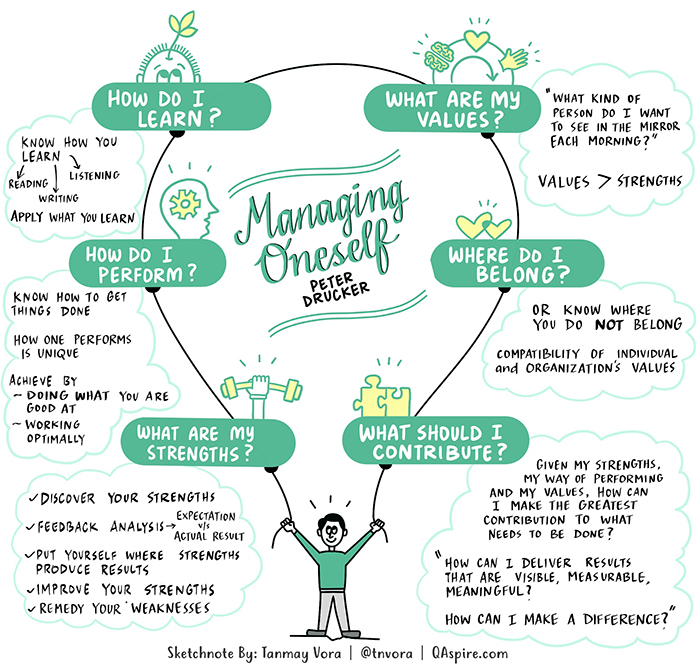Leading the Self in Tough Times: Drucker Revisited
Tanmay Vora
Businesses and individuals are caught in a perfect storm of uncertainties stemming from the current pandemic. It feels like the “future of work” that people often referred to in fancy conferences just preponed its arrival! In fact, future happens one day at a time and here we are!
When external context is shifting rapidly, leaders and learners have to evolve too. What may have worked for us in “normal” times to sustain teams and organizations may suddenly feel inadequate.
The way leaders and learners position themselves now will be critical to their success in the future. Organization may provide needed support systems for learning, but we have to take responsibility of our path forward, our learning and putting our learning to deliver meaningful outcomes.
Peter Drucker’s insights in his classic work “Managing Oneself” are still very relevant to the times we live in and come in handy for those who are struggling to position themselves effectively.
Drucker’s insights on Managing oneself is about recognizing one’s unique strengths, identifying how we perform (which is as unique to each one of us just as our strengths), understanding how we learn (and put that learning to good use), knowing our values (and finding work where our values overlap with organization’s values) and clarifying our contribution by applying our unique skills, strengths, learning and values.
Once we fully know ourselves and our motivations, it is about using that intelligence to work with others for creating results we seek to deliver. Drucker urged us to take responsibility of our relationships – which is vital in a networked and collaboration intensive environment we work in.
These ideas are not just relevant for dealing with tough times but also serve well when we are considering critical career transitions. I revisited this classic Drucker article recently (via the book named Classic Drucker). The article can also be read on HBR.
I created a quick sketch note to summarize my understanding of the article and sharing it here with a hope that it helps others too.

Other Assorted Insights I Loved
“Managing in complex adaptive systems means influencing possibilities rather than striving for predictability (good or best practices). Cooperation in our work is needed so that we can continuously develop emergent practices demanded by this complexity.” – Harold Jarche, Revisiting Cooperation
“The process of becoming is better than being. Set big goals and learn to love the work that gets you to them, even if you fall short you’ll still be winning.” – @des_linden (via Twitter)
“The cost of gaining formal education or a degree has skyrocketed over the last 50 years. However, the cost of learning has dropped over the last 50 years.” – (Via Twitter)
“Effective leaders work at making you better. They help you master your current job and expand it so that it’s more challenging.” – Wally Bock, 3 Things Effective Leaders Do
“Your best ideas, those eureka moments that turn the world upside down, seldom come when you are juggling emails, rushing to meet a dead line or in a high stress meeting. They come when you are walking the dog, soaking in the bath or swinging in a hammock.” – Carl Honore
“A short conversation will achieve far more than an email, a survey or an expensive employee engagement project will ever address.” – Simon Terry, The Power of Conversation
“Here’s a secret: Reflection is work. As a leader, please ensure there’s time for intentional stillness. This is the main way how learning & innovation happens.” (Via Twitter)
[New] Visual Leadership Pack of HD Sketchnotes
If you liked the sketchnote above, you can find it in high-resolution along with 68+ other powerful ideas to elevate your game. Check out the Visual Leadership Pack of HD Sketchnotes here.
